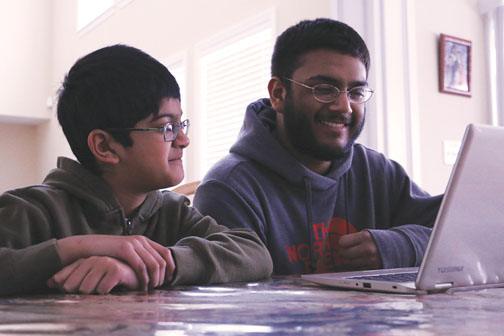One night while watching TV, junior Asif Hossain found himself relating what had been portrayed on TV to his own experiences in an eerily similar way.
He had been watching the second episode of “Fresh Off the Boat,” a TV show that began airing last month that details the lives of members of a Chinese family dealing with a recent move from Washington D.C.’s Chinatown to Orlando, FL.
“(In ‘Fresh Off the Boat,’ the children) used to go to the Chinese Learning (Center) in D.C., but they don’t really have one in Orlando, so the mom makes it up for them so that they study, and I kind of related to that,” Hossain said.
Years before, Hossain’s parents had placed him in an education program outside of school, Kumon, similar to the Chinese Learning Center in “Fresh Off the Boat.”
 For Hossain, he said he enjoyed watching the show because he found that he could relate to its racial diversity.
For Hossain, he said he enjoyed watching the show because he found that he could relate to its racial diversity.
In addition to “Fresh Off the Boat,” Hossain also watches the TV show “Black-ish,” another show with racial diversity.
Recently, many TV shows, such as “The Fosters,” “Fresh Off the Boat” and “Black-ish” are portraying a greater variety of races.
According to Tim Pollard, Chair and Associate Professor of the Department of Telecommunications at Ball State University, TV networks have begun to air more shows with racial diversity because they are trying to gain more viewership from audiences in order to earn advertising dollars.
“Traditional broadcast television continues to see a loss of viewership to niche networks, streaming services and social media. They need to get eyeballs in front of the set,” Pollard said via email. “They are now going after the growing African-American and Latin-American populations. Eyeballs (equal) higher ratings (which equal) more ad dollars.”
To Hossain, one of the reasons he believes TV industries have begun to incorporate more racial diversity is the ability to include different cultures and to target different audiences.
“For years, we’ve had humorous things that Caucasian families do (in comedic TV shows), and (racial diversity is) a way for TV industries to bring in a new type of humor based on the different culture, and it’s definitely targeted toward a different audience based on a lot of the stereotypes that are…true and relatable to the audience,” Hossain said.
Hossain said he enjoys watching TV shows like “Fresh Off the Boat” because they are relatable.
Hossain said, “It was funny, the perspective of an Asian child just like us who moved during 1995 from (Washington, D.C.) to (Orlando, FL), so (‘Fresh Off the Boat’ is) very relatable to me ‘cause it’s almost like revisiting an old experience, but it’s not happening to me…that makes me want to watch it because I look back on those, and I think of memories I had in Kumon and how once it was so annoying, but now I look back at it, and it’s funny how popular it is.”
Junior Frances Sormillon watches the TV show “The Fosters” that portrays the family of a lesbian couple—an African-American and a Caucasian—who take in two foster children and adopt two Hispanic twins. According to Sormillon, one of the reasons she enjoys watching the show is that it addresses sensitive topics including racial diversity.
“I find it very interesting to see characters that differ from the typical all-white cast,” Sormillon said. “It’s nice to see that the entertainment world is evolving to be more racially accepting and diverse. I think it’s great that more shows are taking a risk and trying to open the public eye to a racially diverse society.”
To Sormillon, the growing number of TV shows regarding racial diversity signifies the growing interest of Americans in the lives of people of other races.
“(Audiences) get to see how other people deal with stereotypes,” Sormillon said. “It’s naturally more interesting that way.”
Hossain said these racially diverse shows are opening the eyes of audiences to different cultures.
“‘Fresh Off the Boat’ and ‘Black-ish’ are promoting the acceptance of diversity even more in our culture and how all humans are relatable in our own peculiarities but through different cultures,” Hossain said. “For example, a black family is odd just like a Asian family just like a white family…We’re all odd, so why are we making fun of each other?”

































![AI in films like "The Brutalist" is convenient, but shouldn’t take priority [opinion]](https://hilite.org/wp-content/uploads/2025/02/catherine-cover-1200x471.jpg)










































![Review: “The Immortal Soul Salvage Yard:” A criminally underrated poetry collection [MUSE]](https://hilite.org/wp-content/uploads/2025/03/71cju6TvqmL._AC_UF10001000_QL80_.jpg)
![Review: "Dog Man" is Unapologetically Chaotic [MUSE]](https://hilite.org/wp-content/uploads/2025/03/dogman-1200x700.jpg)
![Review: "Ne Zha 2": The WeChat family reunion I didn’t know I needed [MUSE]](https://hilite.org/wp-content/uploads/2025/03/unnamed-4.png)
![Review in Print: Maripaz Villar brings a delightfully unique style to the world of WEBTOON [MUSE]](https://hilite.org/wp-content/uploads/2023/12/maripazcover-1200x960.jpg)
![Review: “The Sword of Kaigen” is a masterpiece [MUSE]](https://hilite.org/wp-content/uploads/2023/11/Screenshot-2023-11-26-201051.png)
![Review: Gateron Oil Kings, great linear switches, okay price [MUSE]](https://hilite.org/wp-content/uploads/2023/11/Screenshot-2023-11-26-200553.png)
![Review: “A Haunting in Venice” is a significant improvement from other Agatha Christie adaptations [MUSE]](https://hilite.org/wp-content/uploads/2023/11/e7ee2938a6d422669771bce6d8088521.jpg)
![Review: A Thanksgiving story from elementary school, still just as interesting [MUSE]](https://hilite.org/wp-content/uploads/2023/11/Screenshot-2023-11-26-195514-987x1200.png)
![Review: "When I Fly Towards You", cute, uplifting youth drama [MUSE]](https://hilite.org/wp-content/uploads/2023/09/When-I-Fly-Towards-You-Chinese-drama.png)
![Postcards from Muse: Hawaii Travel Diary [MUSE]](https://hilite.org/wp-content/uploads/2023/09/My-project-1-1200x1200.jpg)
![Review: "Ladybug & Cat Noir: The Movie," departure from original show [MUSE]](https://hilite.org/wp-content/uploads/2023/09/Ladybug__Cat_Noir_-_The_Movie_poster.jpg)
![Review in Print: "Hidden Love" is the cute, uplifting drama everyone needs [MUSE]](https://hilite.org/wp-content/uploads/2023/09/hiddenlovecover-e1693597208225-1030x1200.png)
![Review in Print: "Heartstopper" is the heartwarming queer romance we all need [MUSE]](https://hilite.org/wp-content/uploads/2023/08/museheartstoppercover-1200x654.png)




